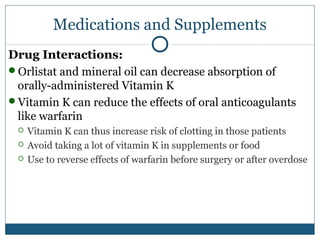

Vitamin K1 may interact with other medications.A small gauge needle is recommended for injectable use (subcutaneous or intramuscular) to prevent bleeding at the injection site. Intravenous administration of vitamin K has been associated with severe allergic reactions.Vitamin K1 should not be used in animals with known hypersensitivity or allergy to the drug.While generally safe and effective when prescribed by a veterinarian, vitamin K1 can cause side effects in some animals.
 Vitamin K also has been used in dogs an cats with liver problems unable to produce necessary blood clotting proteins. The primary use of vitamin K is treatment of anticoagulant rodenticide toxicity. Veterinary formulations: Veta-K1® (Vedco), Veda-K1® (Vedco) and various generic formulations. Human formulations: Mephyton® (Merck), Aqua-Mephyton® (Merck) and various generic preparations. This drug is registered for use in humans and animals. Vitamin K1 is a prescription drug and can only be obtained from a veterinarian or by prescription from a veterinarian.īrand Names and Other Names of Vitamin K1. Vitamin K3 also is available for treatment of deficiencies, but this form of vitamin K is much less effective and not recommended for treating blood clotting problems.
Vitamin K also has been used in dogs an cats with liver problems unable to produce necessary blood clotting proteins. The primary use of vitamin K is treatment of anticoagulant rodenticide toxicity. Veterinary formulations: Veta-K1® (Vedco), Veda-K1® (Vedco) and various generic formulations. Human formulations: Mephyton® (Merck), Aqua-Mephyton® (Merck) and various generic preparations. This drug is registered for use in humans and animals. Vitamin K1 is a prescription drug and can only be obtained from a veterinarian or by prescription from a veterinarian.īrand Names and Other Names of Vitamin K1. Vitamin K3 also is available for treatment of deficiencies, but this form of vitamin K is much less effective and not recommended for treating blood clotting problems. 
For this reason, if a blood-clotting crisis is occurring, a whole blood or plasma transfusion may be needed initially.
In animals deficient in vitamin K, administration of vitamin K1 may take up to six to 12 hours before new clotting proteins are produced. Other causes of vitamin K deficiency include liver disease (which can result in poor absorption of vitamin K1, leading to a deficiency of this vitamin) and medication containing warfarin (excessive doses can result in vitamin K deficiency). There are numerous products that affect this vitamin (including warfarin, D-CON with brodifacoum, bromadiolone, pindone, diphacinone). Chemicals found in the rat bait can inhibit formation of vitamin K1 dependent clotting factors. In dogs and cats, deficiencies of this vitamin are most likely to occur with poisoning by certain types of rat poison. Deficiency or inhibition of vitamin K can lead to a bleeding disorder. One specific function of vitamin K1 involves production of blood coagulation factors. Vitamin K1, is a commonly used prescription drug known as Veta-K1®, Veda-K1® or Mephyton®, is used for the treatment of rodenticide toxicity in dogs and cats and other bleeding disorders associated with vitamin K1 deficiency.







 0 kommentar(er)
0 kommentar(er)
